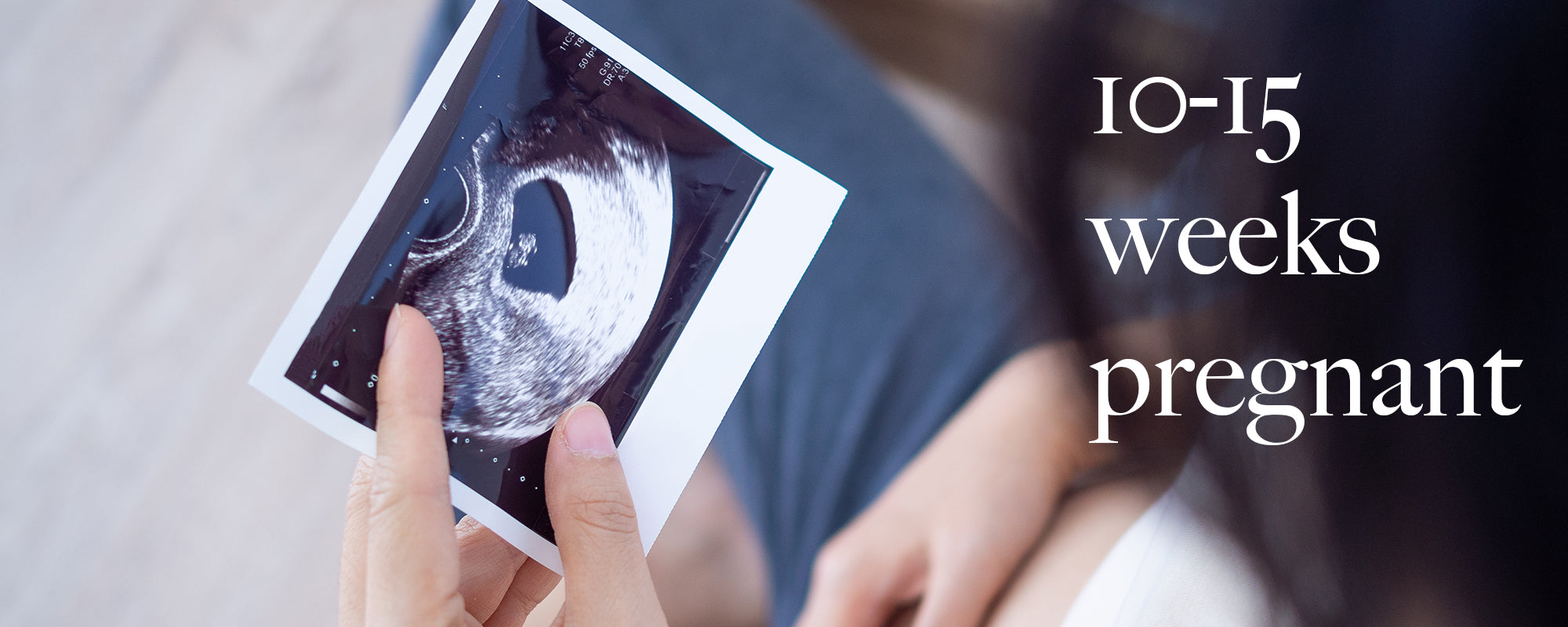

By Cradle & Tonic
You and your baby at 10 - 15 weeks pregnant
10-15 Weeks Pregnant
The Beginning of the Second Trimester
This is one of the most exciting parts of your pregnancy: the end of your first trimester and the beginning of your second! Lots of important things happen at this stage, both for you and your baby.
At the beginning of the second trimester – more precisely, around week 12 – you are going to “meet” your baby for the first time at your routine ultrasound. Here, your midwife or consultant will measure your baby, check fluid levels, and, if you have agreed to it, perform a NIPT test.
As the name suggests, this is a non-invasive type of test that will give you more information on your baby’s health. Specifically, it will provide the likelihood of your baby being affected by one of the three main chromosomal abnormalities – T13, T18, and T21.
In the majority of cases, your results should show a low chance of your baby having one of these conditions, but if the chances are higher, your medical team might recommend further testing. Even in this case, it’s entirely your choice whether or not you want to undergo any invasive tests, such as CVS or amniocentesis.
The beginning of your second trimester is also the time when some of your unpleasant early pregnancy symptoms, such as sickness and fatigue, should gradually ease. As your energy and appetite slowly return, you might start to feel much better.
One more piece of good news: once you have reached your second trimester, your likelihood of experiencing a miscarriage drops significantly. Finally, you can start to relax a bit more now and make plans for your baby’s arrival!
What Happens to Your Body?
Your pregnant body keeps experiencing lots of changes, even though you might not be fully aware of them yet, as they may not be very visible.
Pregnancy Symptoms
As we mentioned earlier, the chances are that some of your early pregnancy symptoms might begin to gradually disappear at this point. However, new ones might pop up – let’s find out what these are!
Physical Symptoms
Hormonal changes at the beginning of the second trimester can slow digestion, which might mean that you start experiencing gas, bloating, and constipation. Try to remain active, sip water throughout the day, and eat plenty of fiber.
Speaking of eating, you might realize that your appetite is not only back, but is also a lot more intense than it used to be pre-pregnancy. It’s completely normal: your body is working extra hard to "feed" your growing baby, which might make you feel both exhausted and super-hungry.
In this trimester, most women need around 300 extra calories a day – not quite as many as the old “eating for two” saying, but definitely something to consider!
Some women start noticing a small bulge in their pelvic area: this is the beginning of what will become a beautiful, round pregnant bump! Embrace it as just another of the many incredible changes that your body goes through naturally to support your baby’s growth and development.
Mood and Emotional Changes
The fact that, by the second trimester, you have probably come to terms with the fact that your life is soon going to be completely revolutionized doesn’t always mean that you feel completely happy and relaxed about it.
Your body, your emotions, and everything else around you might feel like they’re changing so rapidly that you can’t keep up, which may cause you to experience feelings of stress, anxiety, and overwhelm.
First of all, be reassured that this is completely normal. However, if you notice that your mood is mostly negative and that you feel unhappy a lot more often than you feel content, don’t hesitate to speak up.
You can talk with your partner, a family member, or a close friend. If things start to feel too overwhelming, know that professional help is available through your GP or midwife.
In the meantime, treat yourself to plenty of soothing “me-time,” incorporate a meditation session into your daily routine, and get as much sleep as possible to recharge and refresh ahead of a new day.
What Your Baby Looks Like
How Big Is Your Baby?
At ten weeks, your baby should be approximately the size of a kumquat, but by week 15 they have already grown to the size of an apple – talk about a growth spurt!
Stage of Development
At the end of your first trimester, your baby’s vital organs have started to form, with some of them (such as the heart, liver, kidneys, and pancreas) beginning to function, too.
Weeks 11 and 12 are also the time when your baby’s genital organs begin to develop, although they still might be very difficult to distinguish on an ultrasound scan.
And did you know that your baby is already pretty active in there? You might not be able to feel those tiny kicks and punches yet, but you can probably catch a glimpse during a scan. At this stage, scans can also show babies making cute sucking movements, as well as using their facial muscles to squint, frown, and try out other expressions.
How amazing is all this? Brace yourself for weeks 16 to 20, when even more breath-taking things will be taking place! Meanwhile, take the time you need to rest, unwind, and enjoy every single day of this incredible journey.
